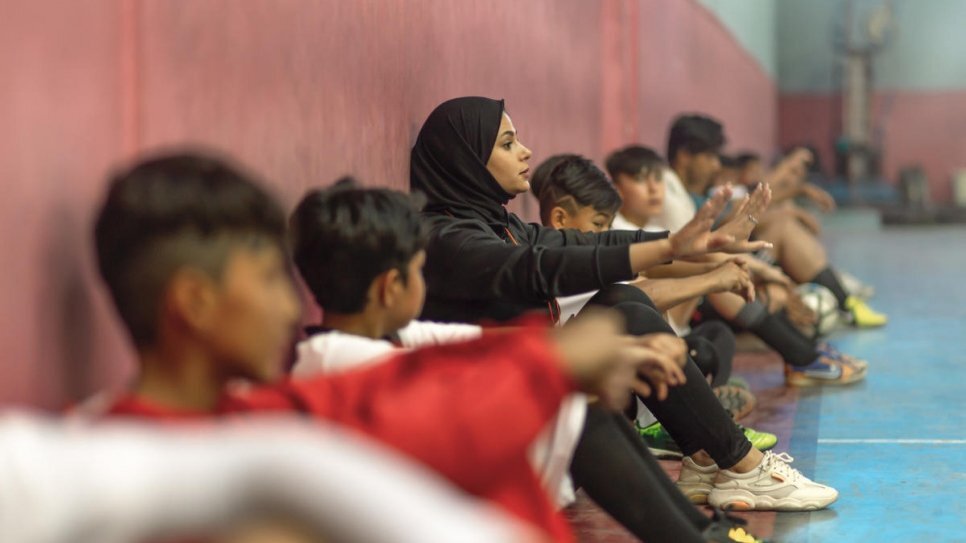Afghan coach helps young refugees back to school in Iran

TEHRAN – Rozma Ghafouri, a 29-year-old sports coach, draws on her own to get young refugees and undocumented Afghans aged between 11 and 15, out of work, and back into school.
“Sport is the best way I have found to help children in a vulnerable situation to open up. After every practice, I speak to them about everything and anything until they feel comfortable to talk to me about the issues they are facing at home,” says Rozma.
“I used to see Afghan children working instead of playing. They wore used work clothes instead of being in uniforms. They weren’t smiling,” recalls Rozma. “Through sports activities, we are able to get many of these children to forget their challenges.”
Rozma and her family fled Afghanistan 23 years ago. After working as, a laborer for much of her childhood, she founded the Youth Initiative Fund in Iran’s southern city of Shiraz in 2015 to help at-risk children.
With the backing of UNHCR, and its Iranian government counterpart, the Bureau for Aliens and Foreign Immigrants’ Affairs (BAFIA), the project now helps some 400 children a year, many of them out-of-school girls, through inclusion in sports and social activities, enrollment in literacy and numeracy courses and counseling with their families. Seeing what an impact the project has had on Afghan children’s lives in Shiraz, UNHCR and BAFIA are in the process of duplicating it in other provinces of Iran.
Every day, volunteers with the Youth Initiative – who include Afghans and Iranians – go door to door in the neighborhoods of Shiraz to talk to the parents of children who have either never gone to school or have had to drop out. Rozma and the team build a relationship with the parents and seek permission for their children to come to sports practice every week.
As the parents see the positive change that sports activities led by Rozma have on their children, they become more willing to listen to her pleas to let them go to school.
“It is difficult to try to convince parents who are most worried about putting food on the table that their children should be allowed to just be children and go to school,” she says, recalling the countless times she has had doors slammed in her face.
While both boys and girls must often work to help their families, girls face the added challenge of cultural norms which view it as unnecessary for daughters to be educated. Some in the Afghan community are also pressured into early marriage.
For her dedication to helping young Afghans in Iran, Rozma has been chosen as the regional winner for Asia for UNHCR’s Nansen Refugee Award, a prestigious annual prize that honors those who have gone to extraordinary lengths to help forcibly displaced or stateless people.
The Nansen Refugee Award is named in honor of Norwegian explorer, humanitarian, and Nobel Peace Prize winner Fridtjof Nansen, the first High Commissioner for Refugees, who was appointed by the League of Nations in 1921. It aims to showcase his values of perseverance and commitment in the face of adversity.
This year’s award laureate will be announced on 1 October and the prize will be presented by UNHCR at a virtual ceremony on October 5.
Rozma was nearly six years old when the Taliban overran her hometown in the northeast Afghan province of Kapisa and she fled the country with her parents and four siblings. In Iran, she was safe, but during her first years in exile, the family barely had enough to live on, let alone to cover school fees.
FB/MG
Leave a Comment